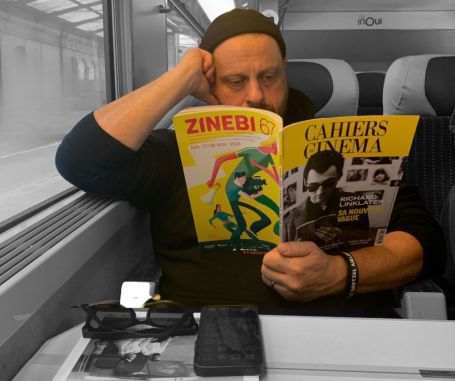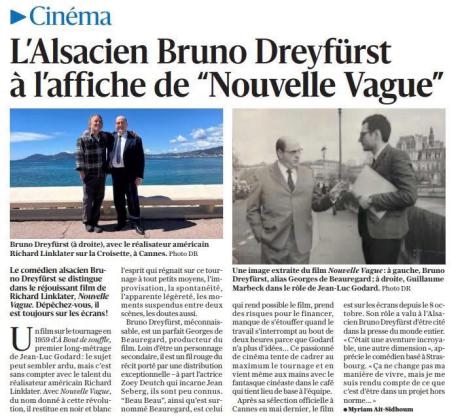
Review
A wonderful Bruno Dreyfürst - Pete Hammond, Deadline
Bruno Dreyfürst, tremendous - Jake Coyle, The Associated Press
À bout de souffle con Georges de Beauregard (el gran Bruno Dreyfürst) como productor - Diego Batlle, Ostros Cines
Georges de Beauregard, embodied with believably elevated blood pressure by Bruno Dreyfürst - Micheal Andor Brodeur, The Washington Post
Bruno Dreyfürst, playing what used to be called the Robert Morley part - Alfred Soto, Humanizing The Vacuum
Dreyfürst is also very good as Beauregard, providing the consistent comedic foil of the exasperated adult in the situation juxtaposed against Godard’s devil-may-care creative genius. - Garret Eberhardt, Recent Releases Cinema Babel
The hilariously exasperated producer Georges de Beauregard (Bruno Dreyfürst) - Scott Tobias, Vulture
En medio de un escenario creativo semejante, el productor Georges de Beauregard (Bruno Dreyfürst) se vuelve una figura esencial, atrapada entre la necesidad económica y el vértigo artístico. - Aglaia Berlutti, Hipertextual
Bruno Dreyfürst is Georges de Beauregard
At the Cannes premiere he becomes more determined than ever to make his first feature, enlisting jaded producer Georges de Beauregard (a wonderful Bruno Dreyfursft) to put up the money. But this is going to be a film done like no other since Godard’s rules of no script only notes, no color, no scope, no sync sound so he can shout out directions, and dialogue he writes in a café each morning before the day’s shoot.
Linklater doesn’t mimic Godard here, though he gives us a good idea of what the director — played by newcomer Guillaume Marbeck, who bears an uncanny resemblance to the man himself — could have been like to work with. In a nutshell, Godard was impossible, refusing to write a real script, calling it a day on set when he ran out of ideas, disrespecting laws of filmic continuity and getting into a fistfight at one point with his exasperated producer, George de Beauregard (Bruno Dreyfürst).
Now it’s Godard’s turn, if he can strike a deal with the producer Georges de Beauregard (Bruno Freyfürst). Godard does so by agreeing to make a gangster-and-a-girl movie based on a treatment by Truffaut, and by saying he’ll shoot it in 20 days.
Bruno Dreyfürst is Godard’s long-suffering producer George “Beau Beau” Beauregard - whose disagreements with Godard over money lead to an undignified physical scuffle in a Paris cafe
On the heels of the Cannes reception for “The 400 Blows,” the producer Georges de Beauregard (Bruno Dreyfürst, tremendous) agrees to make “Breathless.” Beauregard warily eyes Godard, likely aware of the trouble he’s making for himself. He pleads for Godard to just make a sexy “slice of film noir.”
A marvelous scene with his producer Georges de Beauregard (Bruno Dreyfürst) reveals that the impresario for the Cahiers critics’ transition to filmmaking was affectionately called Beau Beau: “I have nothing written down. I wouldn’t show it to you if I did,” Godard tells him. “I don’t take days off.”
It takes a bit for Nouvelle Vague to find its groove, but once the enigmatic and preternaturally confident Godard takes to the Paris streets with Jean Seberg (Zoey Deutch), Jean-Paul Belmondo (Aubry Dullin), and the hilariously exasperated producer Georges de Beauregard (Bruno Dreyfürst), the film channels the spark and spontaneity of the French New Wave.
There’s a buddy comedy element to Godard’s at times tempestuous relationship with his producer that makes for some of this film’s most trenchant inquiries into the filmmaking mindset. “Paying audiences enjoy a formal narrative,” he cautions Godard as disasters on “Breathless” pile up — a wink to how resistant audiences were toward experimentation in favor of easier, blandly reassuring stories that tell you how to feel, and when, and why
Cocky to a fault, and without warrant (yet), he [Godard] lagged behind his fellow Cahiers du cinéma critics – Truffaut had made the classic 400 Blows at this point – and felt like he was standing on the shore as if he had missed the wave. It shook his confidence but bolstered his braggadocious in a way that convinced producer George de Beauregard (Bruno Dreyfürst) to fund Godard’s feature, a mere kernel of an idea based on a news story of a gangster and his girlfriend and that’s it.
The young director’s approach to the 20-day shoot is well-documented: he would write scenes and lines on the hoof and send everyone home for the day when he had run out of ideas. This exasperates Seberg, amuses Belmondo and infuriates the otherwise good-natured producer; it also fuels the wry comic verve of an enterprise that is presented as half genuine desire to make a masterpiece by tearing up the rulebook, half a kind of punk rock provocation.
Godard est un peu fou, il écrit les scènes une heure avant l’arrivée des acteurs pour que justement ils soient eux-mêmes, car « plus on répète, plus on s’éloigne de la vie », il se bat mais genre physiquement avec son producteur Georges de Beauregard, il décide après une heure de tournage que la journée de travail est terminée, tout est folie.
Auch die Tauben wirken gecastet. Angeblich liegt gar die Asche im Aschenbecher wie damals, 1959 in Paris, als ein todesmutiger Produzent (Georges de Beauregard, gespielt von Bruno Dreyfürst) so verrückt war, einem jungen Filmkritiker namens Jean-Luc Godard das Geld für sein Regiedebüt in die Hand zu drücken, eine kleine Geschichte um einen Gangster und seine Freundin, auf der Flucht vor der Polizei.
Derrière la légèreté apparente, Nouvelle Vague raconte aussi les doutes, les tensions, les paris fous qu’implique toute création. L’une des plus belles scènes montre un Godard désabusé avouant à son producteur, Beauregard, qu’il n’aurait jamais pu faire ce film avec un autre que lui, un ami. Un hommage vibrant au rôle souvent invisible — mais essentiel — du producteur dans la fabrique du cinéma.
In “Nouvelle Vague,” Godard’s unpredictable working methods and casual attitude toward the schedule are shown to repeatedly frustrate the producer Georges de Beauregard (Bruno Dreyfürst), who, Brody writes, really did get into a physical altercation with Godard in a café after the director had feigned illness and called off shooting for a day.
https://www.nytimes.com/2025/11/15/movies/nouvelle-vague-references-explained.html
Some of the best moments are between Godard and his producer, Georges de Beauregard (Bruno Dreyfürst), who lives in a constant state of alarm and irritation at the director’s eccentricities during a shoot that seems increasingly doomed to fail. Godard here is something of a prankster, perennially tormenting his collaborators while also considering them friends.
Seeing it is all the motivation Godard needs to aspire to become the last of the Cahiers du Cinéma staff, at age 29, to take the plunge into directing, backed by his close friend, the legendary producer Georges de Beauregard (Bruno Dreyfürst).
Frustrated that he’s the only film critic from Cahiers du Cinéma magazine who hasn’t directed a movie, Godard finally gets his shot thanks to his friend and producer Georges de Beauregard (Bruno Dreyfürst). He’s given “Breathless”, a story conceived by Truffaut who is just coming off the success of his debut feature “The 400 Blows”. With backing by de Beauregard, encouragement from Rossellini (Laurent Mothe), and advice from Melville (Tom Novembre), Godard begins his filmmaking odyssey.
After many of his fellow writers at “Cahiers du cinéma” made their first movies, film critic Jean-Luc Godard (Guillaume Marbeck) feels the time is right to make his own mark on cinema. He convinces flustered producer Georges de Beauregard (Bruno Dreyfürst) to greenlight a treatment co-written with fellow critic, friend, and filmmaker Francois Truffaut about an aspiring gangster.
Paris 1959. Tired of watching Cahiers du cinéma colleagues make their film debuts, critic Jean-Luc Godard (first-time actor Guillaume Marbeck) announces he’s ready to create his own. A treatment co-written with Truffaut attracts producer Georges de Beauregard (Bruno Dreyfürst, playing what used to be called the Robert Morley part), who gives the go-ahead under the mistaken impression that Godard will make a gangster film in the style of Godard’s beloved Howard Hawks.
Instead, the film feels more like a workplace comedy. You have coworkers ribbing each other and professional jealousies and an overbearing boss in the form of producer Georges de Beauregard (Bruno Dreyfürst), who quickly comes to regret giving Godard the money to get this thing made. That lends the proceedings a breezy, comic air; this isn’t in quite the same mode as Linklater’s hangout movies, but it’s not far off either.
Godard tells its director Georges de Beauregard (Bruno Dreyfürst) not only that he didn’t like the film, but also that “the best way to criticize a film is to make one.”
[...] Godard enlists de Beauregard to be the producer, and casts Jean-Paul Belmondo (Aubry Dullin) as Michel and American actress Jean Seberg (Zoey Deutch) as Patricia, and proceeds to drive them all crazy with his confounding directions and rebellious decisions which imperil the production.
Deutch and Marbeck shine as Seberg and Godard, transforming into the pair not only physically but capturing their dynamic as both star and director on a challenging film set and their individual quirks and stories. Dreyfürst is also very good as Beauregard, providing the consistent comedic foil of the exasperated adult in the situation juxtaposed against Godard’s devil-may-care creative genius.
Un producteur à bout de souffle, perdu face à un réalisateur qui n’en fait qu’à sa tête : Georges de Beauregard (Bruno Dreyfürst).
The biggest points of conflict that arise in the film are over producer Georges de Beauregard’s (Bruno Dreyfürst) and actress Jean Seberg’s (Zoey Deutch) increasing frustrations with Godard’s freewheeling approach—for flippantly burning money on half days and unused stuntmen, and for disregarding the actress’s process. Just as Godard seems to shrug these issues off, so does Nouvelle Vague, and the tensions between the creatives remain at a simmer.
Sinon mention spéciale pour mes préférés : Guillaume Marbeck qui non content de ressembler à Godard parle comme lui, à des rictus similaires et une espièglerie qu’on imagine volontiers dans sa jeunesse, aussi Bruno Dreyfürst qui joue le courageux producteur Georges de Beauregard désespéré du tournage inimaginable qui se déroule sous ses yeux et qui est en train de brûler son cash
En Nouvelle Vague, los impredecibles métodos de trabajo de Godard y su actitud despreocupada hacia el calendario frustran repetidamente al productor Georges de Beauregard (Bruno Dreyfürst), quien, según escribe Brody, llegó a tener una pelea física con Godard en un café después de que el director fingiera estar enfermo y cancelara el rodaje durante un día.
Cada uno aporta una personalidad distinta a ese caldo creativo donde la cinefilia se mezclaba con la urgencia juvenil. En medio de un escenario creativo semejante, el productor Georges de Beauregard (Bruno Dreyfürst) se vuelve una figura esencial, atrapada entre la necesidad económica y el vértigo artístico. Linklater observa estas dinámicas con una distancia afectuosa.
It is the première of La Passe du Diable – produced by Georges de Beauregard (Bruno Dreyfürst) and distributed by 20th Century Fox – but talk at the party is dominated by Chabrol’s Le Beau Serge, which appeared at Cannes the previous year, and Truffaut’s The 400 Blows, about to screen at the 1959 festival.
At times you even wonder if the film will get finished, as Godard continually seems to get in his own way with on-the-fly script revisions, short shooting days and tricky camera moves; it’s no wonder he ends up in a scuffle with his producer Georges ‘Beau Beau’ de Beauregard (Bruno Dreyfürst) at one point. But throughout, there’s such an infectious spirit of creation, it’s like Linklater is making a rallying cry to grab a camera, get out there and just create.






![among others (including Godard’s friend and producer, Georges de Beauregard [Bruno Dreyfürst]), over the course of the film’s 20-day-long shoot.](https://www.bruno-dreyfuerst.com/s/cc_images/thumb_87969858.jpg)
































